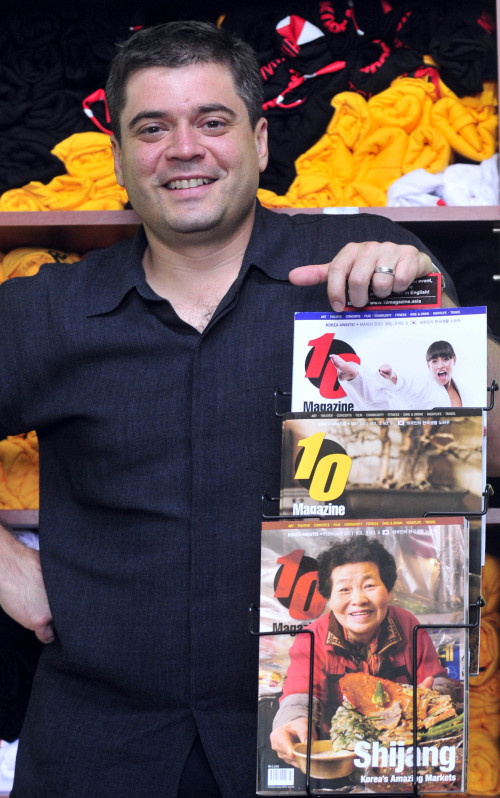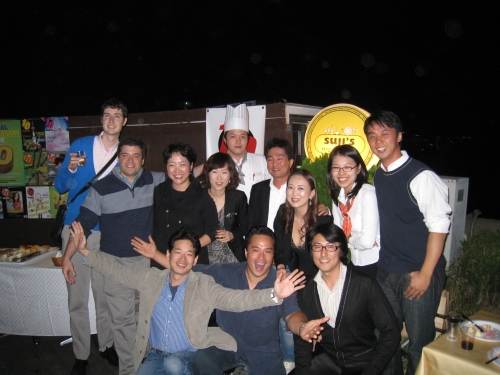But Revere didn’t become notable in the foreign community until 2004 when he became the first Westerner to receive a master’s degree in Teaching Korean as a Second Language, at Yonsei University.
His classmates there, whom he describes as “incredible,” are still some of his best friends.
This achievement no-doubt helped get him the spot as a host on Arirang TV’s “Let’s Speak Korean,” which ran for two seasons of 130 episodes each.
Even now (he left the show in 2007), fans of the jovial program, which featured Revere with female co-host Lisa Kelley, still comment on his Facebook page, asking Korean language questions or thanking him for the help the program has given them.
“Foreigners couldn’t care less that I was on television until I did that show and then I gained some notoriety amongst them for having helped them learn Korean, and that’s pretty ‘boram-i it-da’ ― it makes you feel good about yourself and what you’ve done learning this language to the point where you can teach it to people from other countries.”
Having now written two well-received books on learning Korean, and having spent many years teaching, Revere could be considered as something of a foreign expert on the language.
But the language-learning environment was very different when he began to teach himself upon his arrival.
“It’s nothing like when I learned. I was playing a tape in a cassette player 15 years ago going for my runs. And then it was done, it was go out and talk to people.”
To perfect his skills, he completed the two intensive language courses ― at Yonsei University and Seoul National University.
“The materials were minimal when I was learning, I probably bought everything there was for sale. There were only a few books to learn the language so that was the number one thing that was lacking.
“Especially once you reached a certain level, the only place that had materials of any use were large scale language programs.”
Now, said Revere, things are very different, largely due to the wide selection of resources available, both on the Internet and in terms of course choices.
“The teachers are more experienced. When I started there was no degree in teaching Korean as a second language, so you couldn’t even major in it.
“Now you’ve got people with MA degrees and Ph.D.s teaching Korean as a second language who are experts, so that’s an incredible change.”
Revere recommends, above all, listening when trying to learn Korean.
“Do more listening: in language and in life. People don’t spend enough time listening,” he said.
But it isn’t just in language-learning that the country has changed since the ’90s.
“There’s no comparison, it’s a different lifestyle. To say you’re in Korea now as opposed to 15 years ago is just two totally different things,” said Revere, adding that half the buildings he sees in Seoul now simply didn’t exist then.
The international food choices available today are a sign of the changing times too. “Fifteen years ago I couldn’t get a hamburger and now I’m eating Indian food all the time ... it’s amazing.”
But, sitting in his office on the 10th floor in a high-rise in central Seoul, Revere wouldn’t change a thing. In awe of the fast rate of change in Korea, and glad that he’s been here to witness it, he seems utterly content with where he is now.
“I love it, love it, love it. I had no clue that I would end up being a small business owner, but it’s fun ... being able to be creative with the magazine and at the same time do something that I think to some degree is definitely a public service.”
Although always on the look out for talented contributors, of which he says there are plenty ― in part due to the financial crisis which meant many media graduates struggled to find work in their home countries ― Revere is pleased with the publication’s content, which has featured cover stories including “Have a Blast in a Bang!” and “The Most Munch for Your Brunch.”
For him and his staff, the magazine’s aim has always been to help foreigners get out and enjoy Korea. He feels travelers and expats here should take advantage of the benefits of Korea being a small and accessible country, offering cheap and “spectacular” transport. To this end, it features an extensive and well-researched calendar of events and directory for each province.
He would however like more Koreans to enjoy the magazine, and finds that when they come across it they are usually shocked to find that such enjoyable English magazines exist.
Revere, a keen hiker, now finds pleasantly balanced between the expat and Korean worlds. He lives in Seoul with his Korean wife, with whom he mostly communicates with in her native tongue. And at work with the magazine, he switches 50/50 between Korean and English.
Even his recent wedding was a mix of two cultures.
“We had what I call a ‘modern Korean’ wedding which is a Western wedding but with the Korean style of doing things, like the mothers lighting the candles, and the bowing to the parents.”
Preferring to keep mostly to the typical Western work schedule of 9 a.m. to 6 p.m., Monday to Friday, he spends much of his spare time enjoying the company of his wife and her family, walking on Mount Nam or having barbecues.
His work for the magazine outside office hours is purposely restricted to creative endeavors, such as exploring new online possibilities and keeping abreast of new developments in the industry.
Although Revere misses his family back in the U.S. “terribly,” he is able to visit every Christmas and is at ease speaking of Korea as his home.
“You have to remember, most of my adult life has been spent in Korea. I mean I came here at the age of 24 and I’ve been here ever since.
“It is nice though that I’ve gotten a lot of opportunities to do a lot of interesting things that I would not have had the opportunity to do otherwise, that’s for sure.”
By Hannah Stuart-Leach (
hannahsl@heraldcorp.com)
Stephen Revere
• 10 Magazine CEO and managing editor (2008-present)
• First Westerner to receive master’s degree in Teaching Korean as a Second
Language (Yonsei University, 2004)
• Books:
– Survival Korean (2005)
– Survival Korean: Basic Grammar (2007)
• TV:
– “Star English” on EBSe (2010-present)
– “English Conversation” on EBSe (2001-2003)
– “Super Sunday” on KBS2 (2002)
– “Let’s Speak Korean” on Arirang TV (2004-2007)
– “Happy Dinner Table” on KBS 2 (2006)
– “The World is Wide” on KBS 1 (2006-2007)
• Radio:
– “Listening Special” (EBS: 2003)






![[Exclusive] Hyundai Mobis eyes closer ties with BYD](http://res.heraldm.com/phpwas/restmb_idxmake.php?idx=644&simg=/content/image/2024/11/25/20241125050044_0.jpg)
![[Herald Review] 'Gangnam B-Side' combines social realism with masterful suspense, performance](http://res.heraldm.com/phpwas/restmb_idxmake.php?idx=644&simg=/content/image/2024/11/25/20241125050072_0.jpg)

